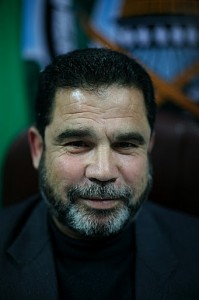Nonviolence, Hamas Style
Civil disobedience has enjoyed a renaissance among Palestinians, most vividly with Palestinian Prime Minister Salam Fayyad’s call for a boycott against Israel rather than armed resistance. (Adam Horowitz and Philip Weiss describe the “Boycott Divestment Sanctions Movement” in this long essay in The Nation. Matt McAllester theorizes in The Daily Beast about why non-violence has failed to win Palestinian hearts.)
It remains possible that civic and political action will replace rockets and suicide bombings as the weapon of choice for Palestinian activists. So far, though, Hamas doesn’t seem too interested. In conversations I had with Hamas officials during a reporting trip to Gaza in January, I encountered glib jokes and incomprehension rather than any serious engagement with the idea of non-violence.
Hamas had suspended support for suicide bombings against Israeli civilians, but only, officials told me, because such attacks were failing to produce the desired effects – not because they were wrong, illegal or counter-productive.
“There are two paths: the path of Gandhi and the path of Al Qaeda,” Hamas parliamentarian and spokesman Salah al-Bardaweel told me. When I asked him which one Hamas would take he paused and then said: “Al Q-andhi!” He bellowed with laughter at his joke.
He did add more seriously that “there are many types of resistance,” and that Hamas promoted social, political, and cultural efforts along with its military wing. He pointed out that some groups have splintered from Hamas because they didn’t consider it militant enough. Historically, Bardaweel argued, Palestinian organizations that focused exclusively on politics and culture at the expense of armed struggle lost popular support. “We are a resistance group, but we can’t let military actions spoil our entire political plan,” he said.
At a seminar for junior Hamas officials at the House of Wisdom, a think tank chaired by Hamas’s deputy foreign minister, a group of men in their twenties and thirties scoffed when I asked if they could imagine Hamas adhering to the Geneva Conventions and using the tools of non-violent protest.
One, a mid-level Hamas bureaucrat named Ahmed al-Najjar, didn’t even understand the concept. “Non-violence?” he said to me. “What have we ever accomplished by the throwing stones?”
An American colleague described the tactics of Gandhi and Martin Luther King. As the American talked, Najjar leaned over to me and chuckled. “Non-violence in this part of the world is nonsense. What do you want? We should stand in front of the Israelis shouting ‘No, no occupation, go, go, occupation’? Non-violence is nothing. It does not work.”


